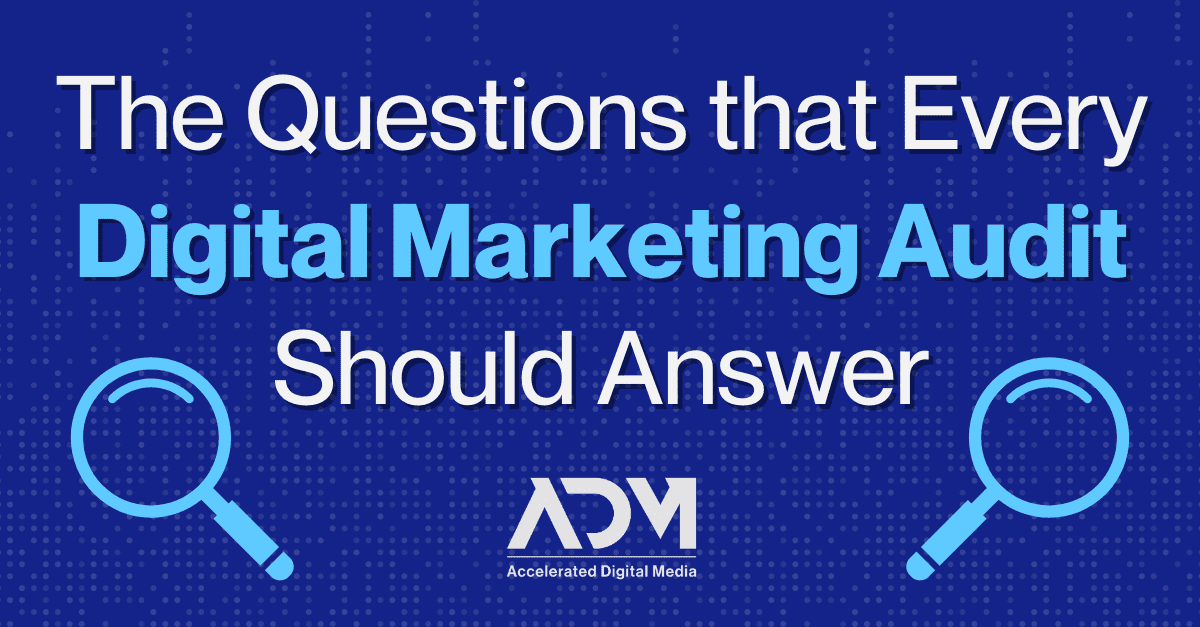A comprehensive digital marketing audit is the best way to assess the value of your current strategies. Ultimately, a good audit will be based not just on the results of your campaigns across paid search and paid social channels, but how those results align with the goals that matter most to your business.
When ADM audits accounts for prospective clients, we go in-depth into their Google Ads and Meta Ads accounts, as well as their Google Analytics and tagging implementations. We base our work on answering a series of key questions about each aspect of the business’s marketing program. Here are the questions that we believe any good digital marketing audit needs to answer.
Questions a Social Media Audit Should Answer
A good social media audit assess if your brand’s social strategies are in line with its business objectives. At ADM, use the following questions as guidance in this effort:
- Is the account structured to support the brand in achieving efficiency and scalability?
- Are there untapped audiences that the brand should explore or audiences that need to be approached differently? (Typically, this involves seeking audience expansion opportunities).
- Is the tracking configured accurately, and are there any tracking error messages from the social platforms?
- Is the brand adhering to best practices in utilizing all available tools on the account?
Beyond evaluating the brand’s social accounts, we also scrutinize ad creative, asking:
- Do all creatives clearly convey the brand’s product/service?
- Is there a variety of creative mediums being used?
- Are the creatives labeled for performance tracking purposes?
- Are they implementing successful creative strategies known to ADM for their industry?
By addressing these questions comprehensively, we can effectively pinpoint any strategic gaps and offer improvement suggestions.
Learn more about our social media audits
Questions a Paid Search Audit Should Answer
When auditing a Google Ads account, ADM begins by looking at the account from a structural level before diving into the details of the ads and campaigns. We first seek to answer:
- How are the Search and Performance Max campaigns set up?
- Does the current campaign implementation align with the brand’s objectives?
- Are campaigns too segmented/overly consolidated?
- Does the current structure give priority to the client’s most important products/services?
- Are the campaigns and ad groups labeled in a way that enable clear reporting and analysis?
After that, we delve deeper into the campaigns to address other crucial questions, like:
- Is the keyword strategy leading to any wasted spend?
- Is there spend overlap across campaigns?
- Is the account experiencing low-quality query traffic?
- Are the client’s outcomes being diminished by their competitive environment?
- Are they using the right keyword match types to match their audience’s intent?
Last but not least, we home in on the auditee’s expansion possibilities, seeking to determine whether there are additional opportunities that they are currently failing to take advantage of.
Learn more about our paid search audits
Questions a Google Analytics Audit Should Answer
The main objective of a Google Analytics audit is to address one critical query: Is your historical data accurate enough to serve as a basis for future strategic decisions?
This question is pivotal to the other facets of the audit, since Google Analytics commonly serves as a brand’s primary data source for evaluating its website and ad performance. If the setup was flawed or incomplete, the company might receive unreliable data hindering their decision-making process. That may make it more difficult to conduct the deepest-possible audit of Meta Ads and Google Ads deployments.
In order to address this query, we delve into a series of sub-questions, namely:
- Is the analytics configuration aligned with industry standards?
- What is the full scope of data that the company is collecting and monitoring?
- Is Google Ads over- or under-reporting certain outcomes?
- Is the data being collected clear and actionable?
Once we’ve established whether the brand is receiving the quality data it needs to fuel its marketing campaigns, we’re able to shape our recommendations for refining their implementation in ways that will enable better decision-making in the future.
Learn more about our Google Analytics audits
If you’ve read through these questions and realized you’re wondering about some of the same things we’ve laid out, consider getting in touch with the ADM team to set up a free audit.
Contact
"*" indicates required fields




